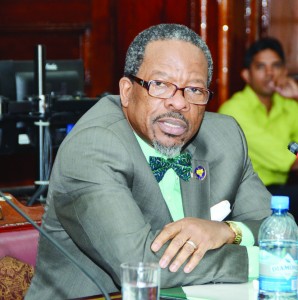– says Guyanese-born U.S expert on security

Guyanese-born U.S. professor on Caribbean security, Dr Ivelaw Griffith said the forging of greater partnership in the local and international arenas might be an answer to some of this country’s security challenges.
Dr Griffith at the time was conversing during a high-profile meeting with U.S. Ambassador D Brent Hardt and Members of Parliament (MP) in the Parliament chamber on Tuesday.
Dr Griffith was told that Guyana continues to be plagued by traditional security challenges as references were made to issues surrounding resources, porous borders, corruption and the security forces’ inability to execute their duties.
Building partnership
Dr Griffith said building greater partnership can be a means of addressing security challenges. It was explained that through partnership, Guyana can fill the gaps by securing the necessary resources.
“Resources are not infinite, resources are limited but it is also true that the challenges on the security landscape are not limited to one country, hence, there is necessity for partnership,” he explained.
According to the Guyanese-born professor, the government of Guyana cannot address matters of security alone, thus it is important for the private sector to step in and take up responsibility.
Lack of monitoring
Alliance For Change (AFC) member Trevor Williams contended that the lack of monitoring of resources are major impediments in Guyana’s security sector. According to him, it is not necessarily an issue of finance, but one that speaks to the lack of institutional capacity.
Considering Guyana’s geographical location, Williams said the country is among key transshipment points, and security forces must maximise and generate resources to combat transnational crimes and other criminal activities, thereby enhancing the level of security.
He was backed by A Partnership for National Unity (APNU) MP Renis Morian, who said the effective use of communication can also remedy security problems facing Guyana.
Dr Griffith, in his response, said there might be cases where the requisite technologies are provided for effective communication; however, the human capacity to capitalise on the resources is lacking, due to the lack of training in the area of information technology.
In keeping with the topical issue of resources, APNU frontbencher, Dr Rupert Roopnaraine alluded to the recent dispute between Guyana and Venezuela when an armed Venezuelan naval ship evicted a U.S. oil explorer from Guyana’s waters.
Additional attention was drawn to the New River Triangle matter in which the Natural Resources and Environment Ministry through the Guyana Geology and Mines Commission (GGMC) issued Permission of Geological and Geophysical Survey (PGGS) to Muri Brasil Ventures Limited; a move that would have paved the way for the issuing of a maximum of 18 prospecting licences for rare earth elements, bauxite, gold and diamond.
Considering Guyana’s porous borders and recent occurrences, Dr Roopnaraine said the country should maximise on diplomatic resources to safeguard itself, in the area of border security.
Not unique
In response, Dr Griffith said maritime and territorial issues are not unique to Guyana, positing that it is often a concern of many nations across the hemisphere. It was posited that most nations do not have the ability to single handedly take military action, hence “military cooperation” becomes critical.
AFC members Valerie Garrido-Lowe and Cathy Hughes; APNU’s Vanessa Kissoon, and Christopher Jones; and People’s Progressive Party/Civic (PPP/C) representative Joseph Hamilton were among parliamentarians that contributed during the forum.
Apart from being a professor of political science, Dr Griffith serves as provost and senior vice president at York College of the City University of New York.
His notable achievements there include growing the full-time faculty by 30 percent over four years, re-organising the academic division into three schools and enhancing the research and scholarly climate by creating a Provost Lecture Series and a companion Distinguished Scholars Lecture Series.
In addition to addressing security issues, Dr Griffith will be building partnership with the University of Guyana, the University of the West Indies, the Fort Valley State University and the University of Puerto Rico.
He is in Guyana on an official visit upon the request of the U.S. embassy. After leaving Guyana on Tuesday, his next official visit is set for Trinidad and Tobago.



